Tuesday Triage #22
- TUESDAY TRIAGE #22 by Vadim Drobinin
- On going public
- Things I enjoyed reading
- 1. Important Notes on Learning Languages by Luke Smith
- 2. Anti-Pasta: When Italian Futurists Tried to Ban Pasta in Italy by @ellengutoskey
- 3. Knowledge Shares For Great Good by @ashfurrow
- 4. The Hidden Fruits of the Deep by Georgina Wood
- 5. Why Software Is Eating the World by @pmarca
- 6. To listen well, get curious by @benskuhn
- 7. Why I keep a personal log of bugs by @gilgado_
- 8. What Did the Past Smell Like? by Ann-Sophie Barwich
- 9. Become shell literate by Drew DeVault
- 10. Buy Don't Build: Avoiding Ops For Fun and Profit by Jake Rottersman
- Things I didn't know last Tuesday
- 1. Squirrels used to be pets
- 2. Mooning
- 3. Salmon sushi is not a Japanese invention
- 4. Teledisko
- 5. Eye color changes past early childhood
- 6. The Water Clock
- 7. Earwax type is controlled by a gene
- 8. Moët Ice Impérial
- 9. Mozart wrote his first symphony because he wasn't allowed to play
- 10. Cryofiltration
- Book of the week
- Thank you and see you in a week!
TUESDAY TRIAGE #22
by Vadim Drobinin ¶
Your weekly crème de la crème of the Internet is here!
15.12.2020 (read in browser)
On going public ¶
Recently Sasha and I were offered a chance to mix 140 cocktail servings, bottle them, and make labels with our own design.
Given our passion for all things liquid and burning, and the fact that we don't do mixology for a living, the only sensible reaction was to agree.
We had a chance to bottle some home-brewed beer before, but six bottles is not forty.
A cocktail starts with a story, and we wanted to have this drinks as festive as possible, so decided to build up two different recipes. One was a light aperitif with subtle Earl Grey Tea notes, a distant Martini's relative. We called it La Befana after a woman from Italian folklore similar to Santa Claus.
The other one was bold and cinnamon-forward riff on an Old Fashioned, called Apple Pie on the Rocks, where each sip reminds of a bite of an apple pie.
Sasha did a great job designing labels:
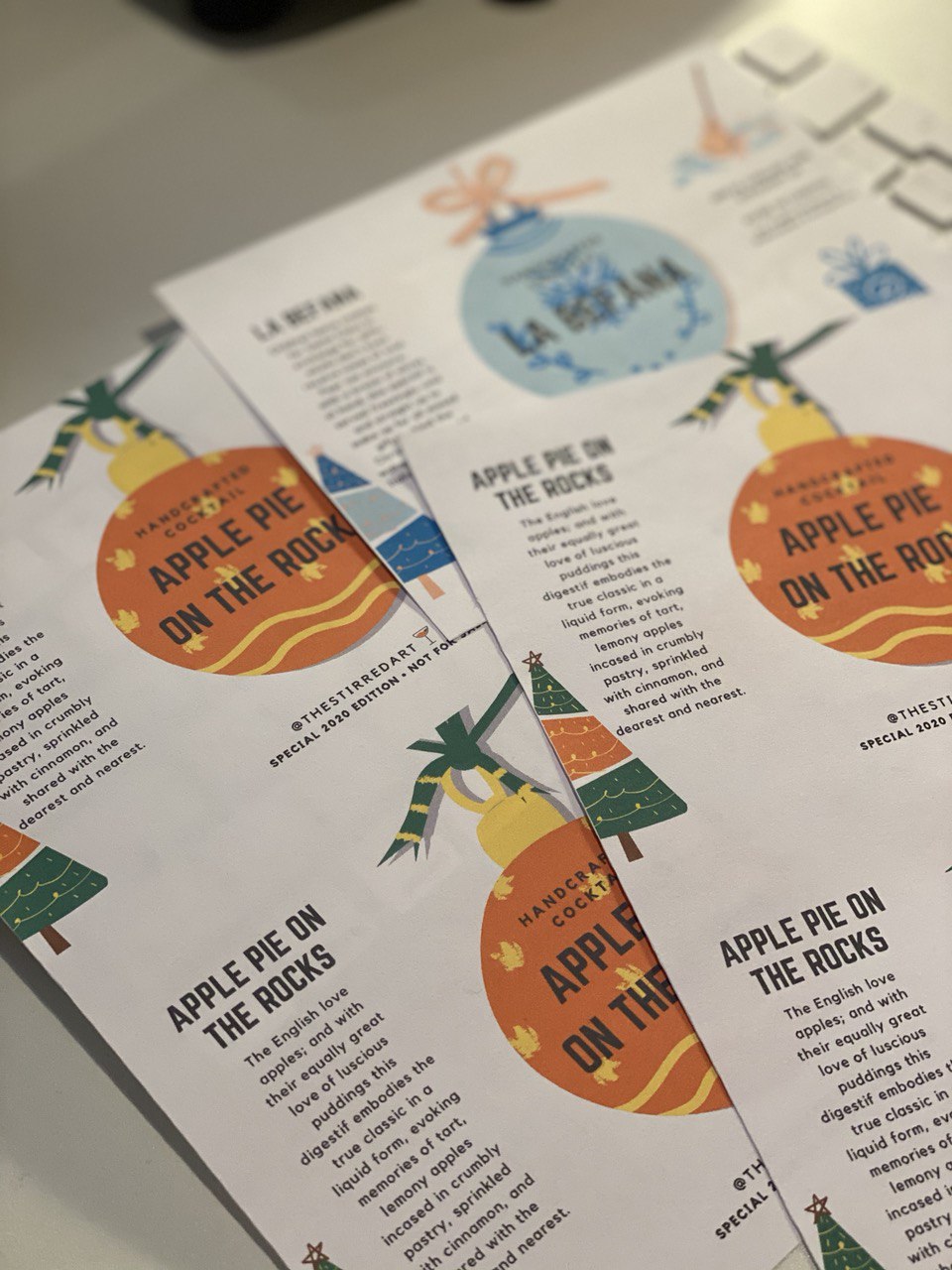
And I did a few rounds of sampling to make sure the cocktails are bottled with an appropriate level of dilution (as otherwise they will be either too strong or too blunt).
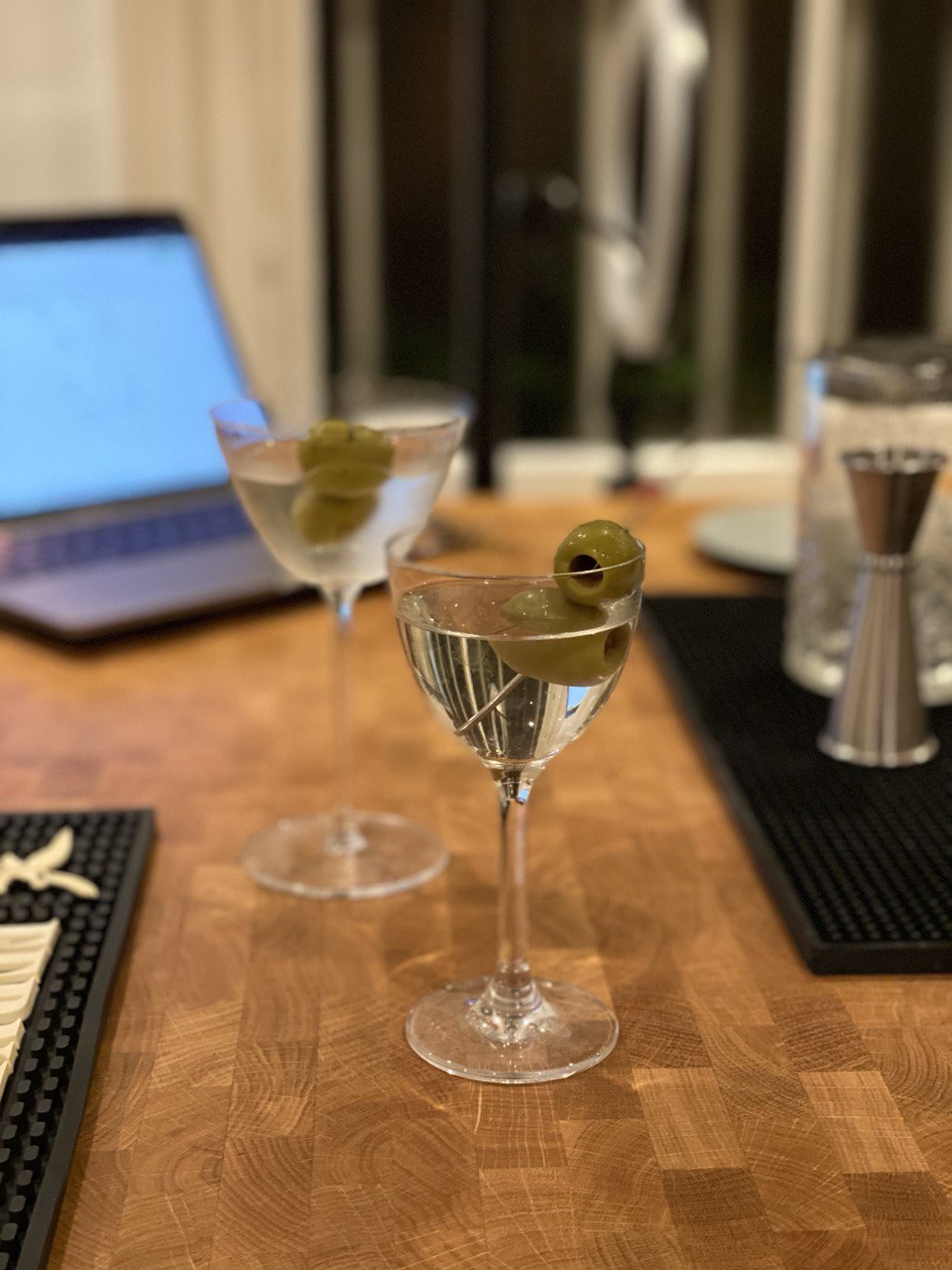
We had to mix around four-five batches for upscaled recipes.
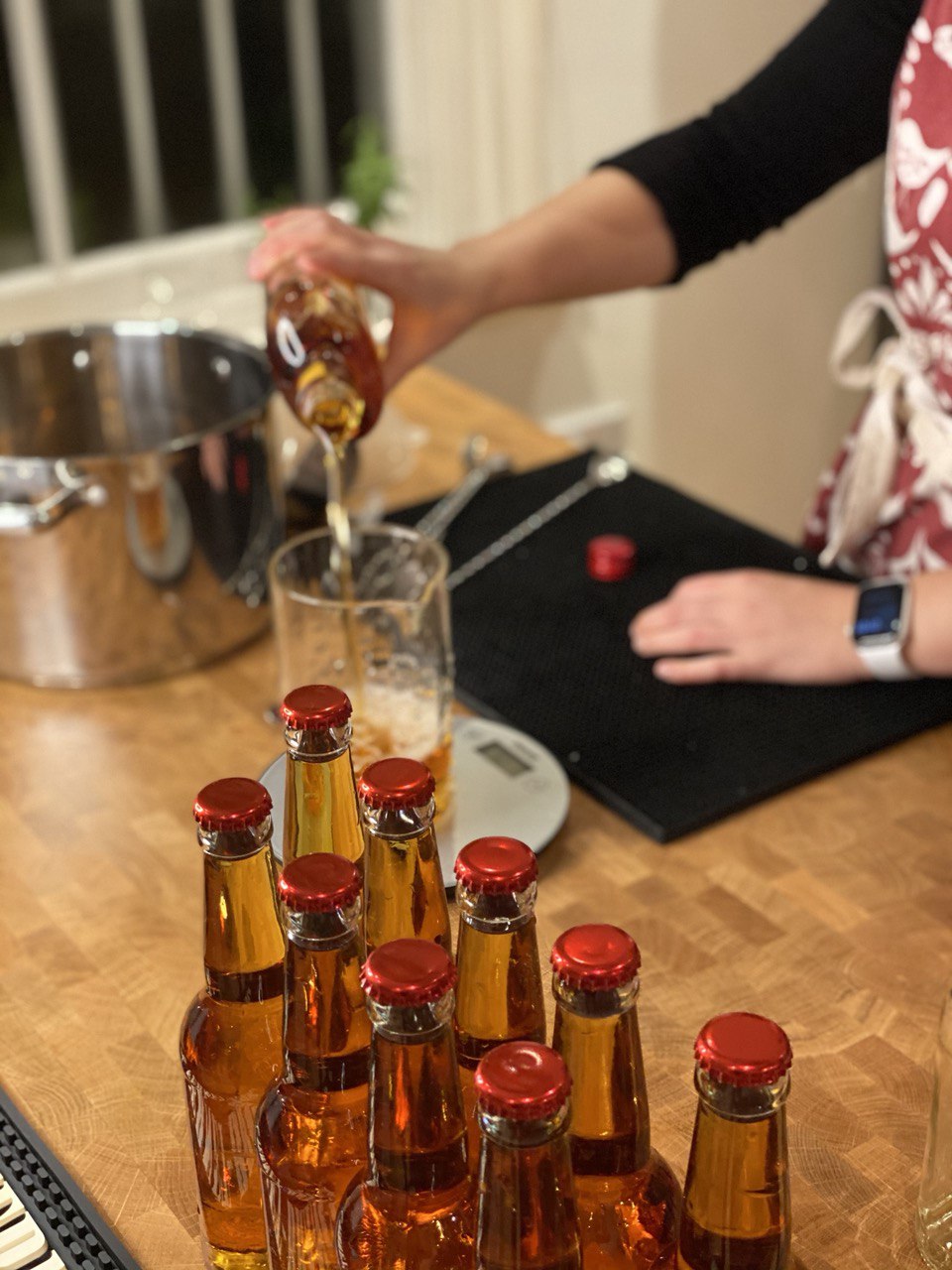
And as we had precisely the same number of bottles as we wanted to gift, bottling them was quite a nervous process.
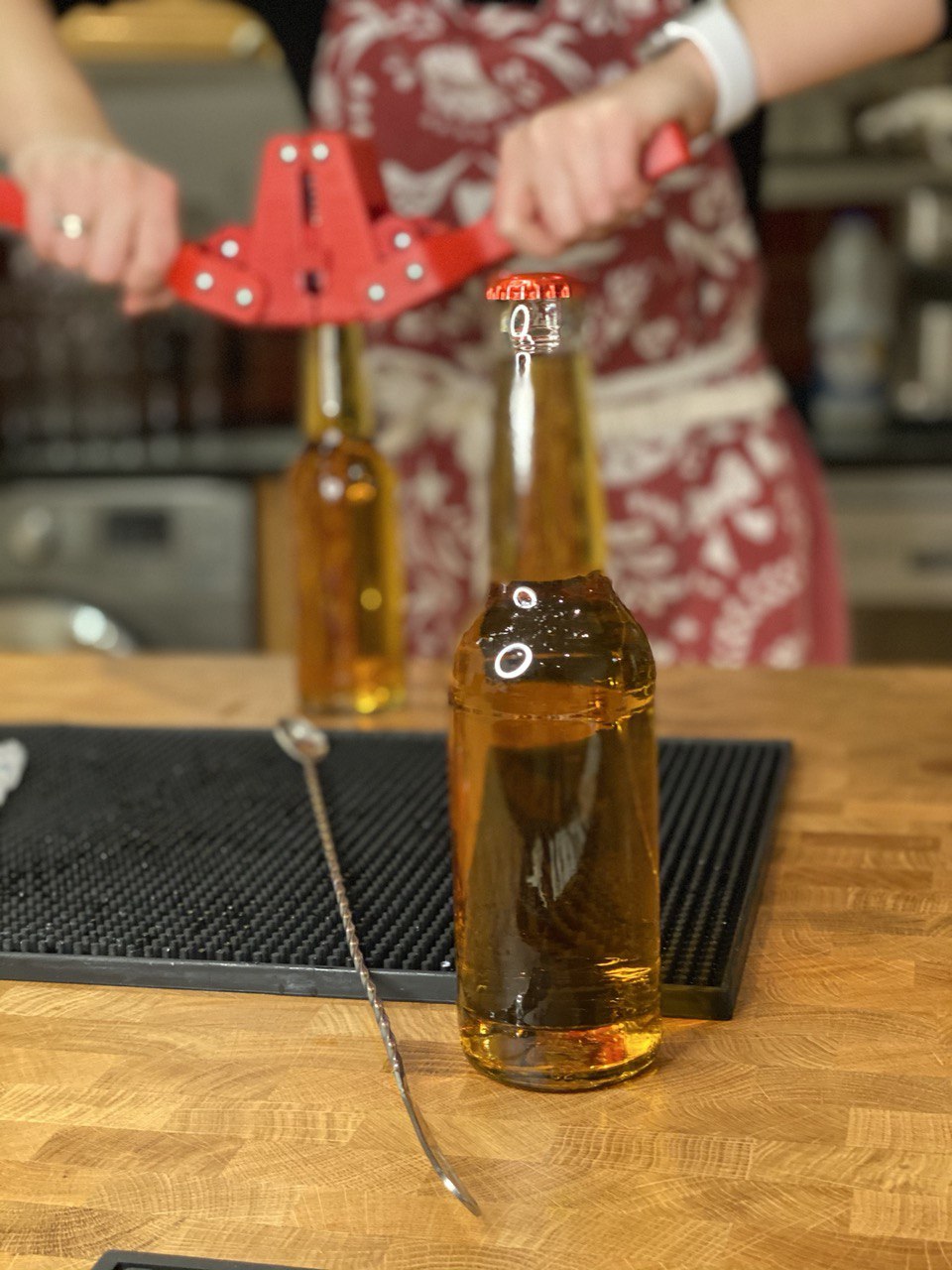
We've glued labels using the milk lifehack I've shared recently.
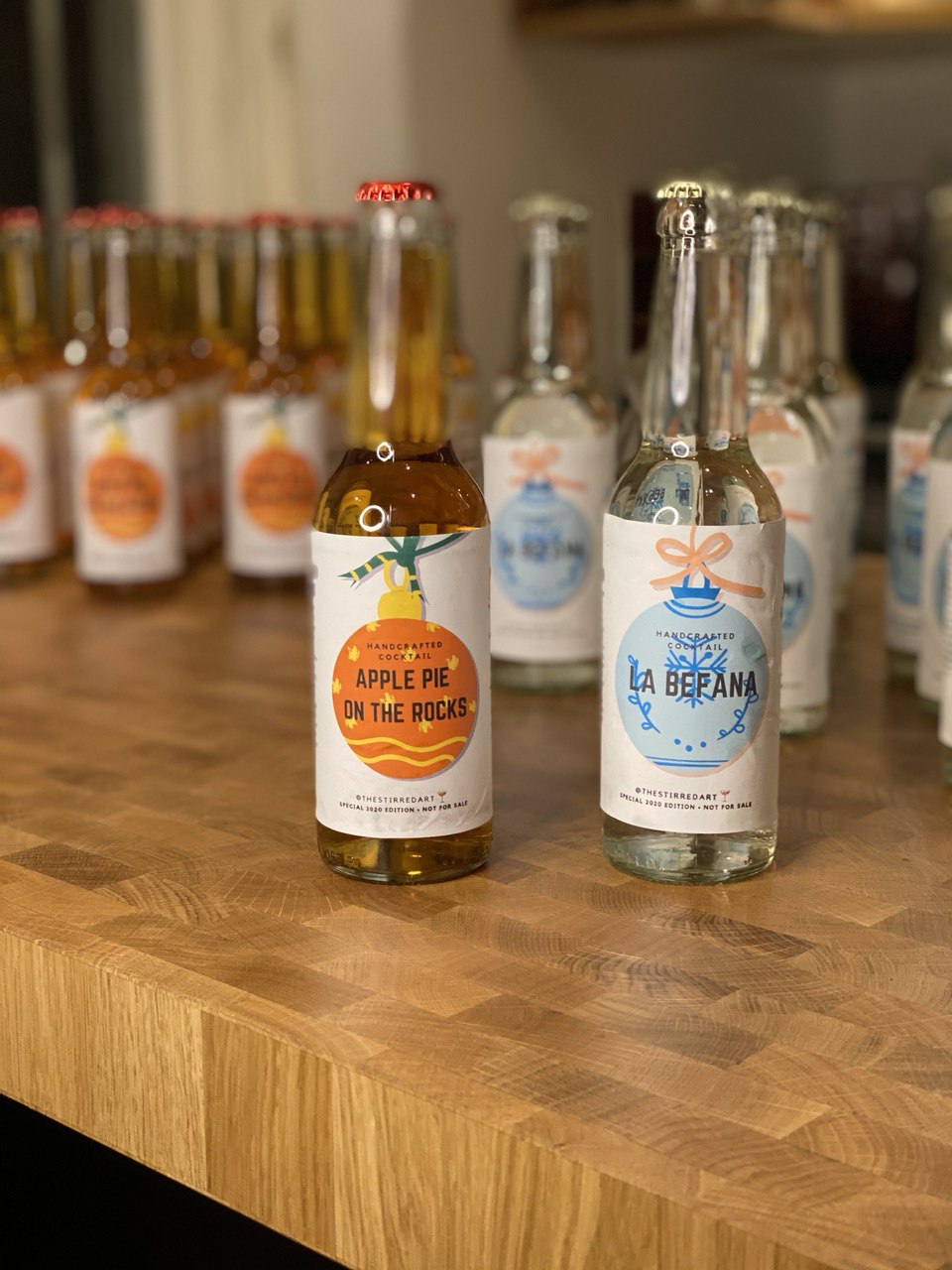
Seems like both drinks worked out quite nicely, and folks enjoyed them.
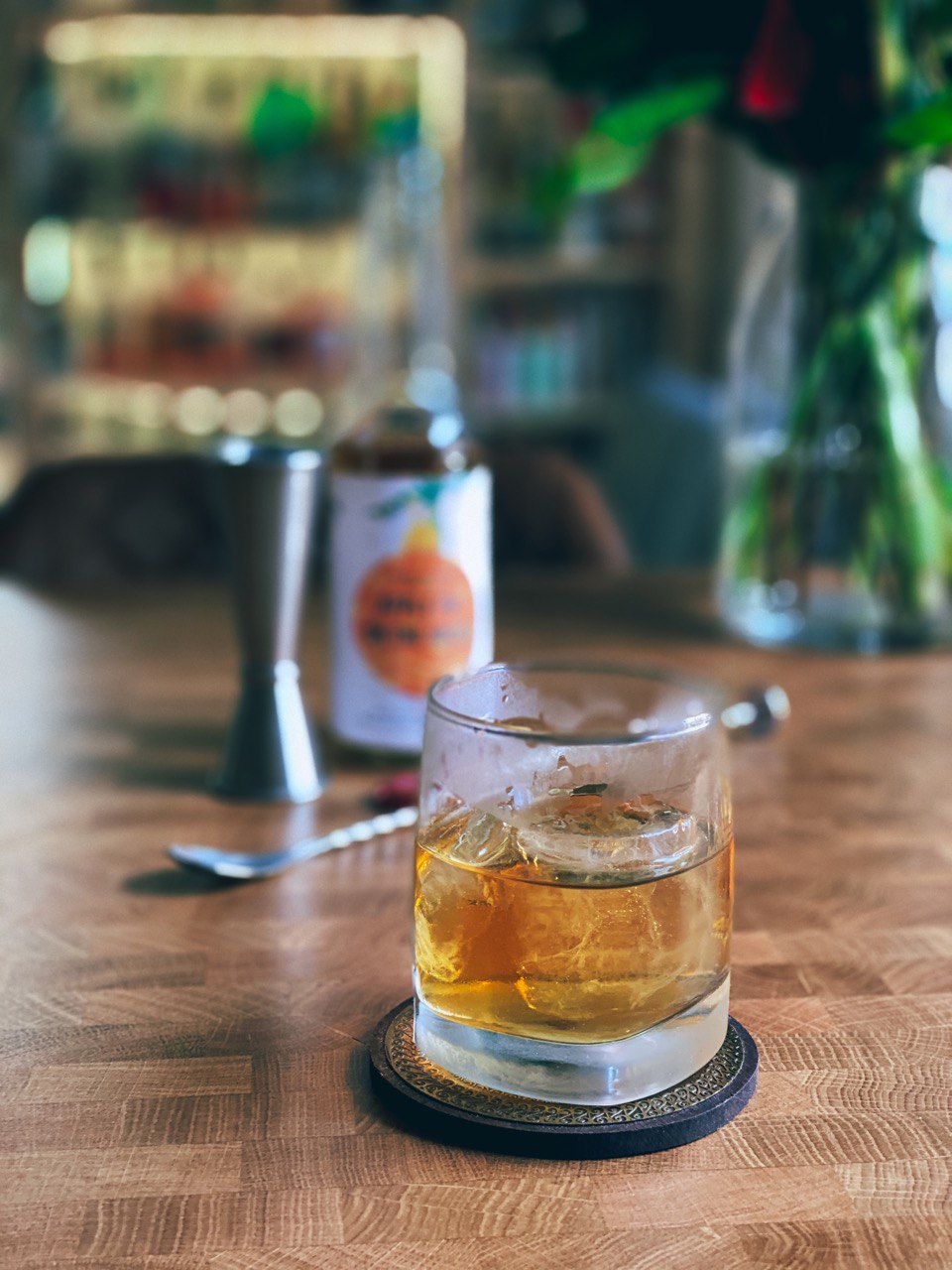
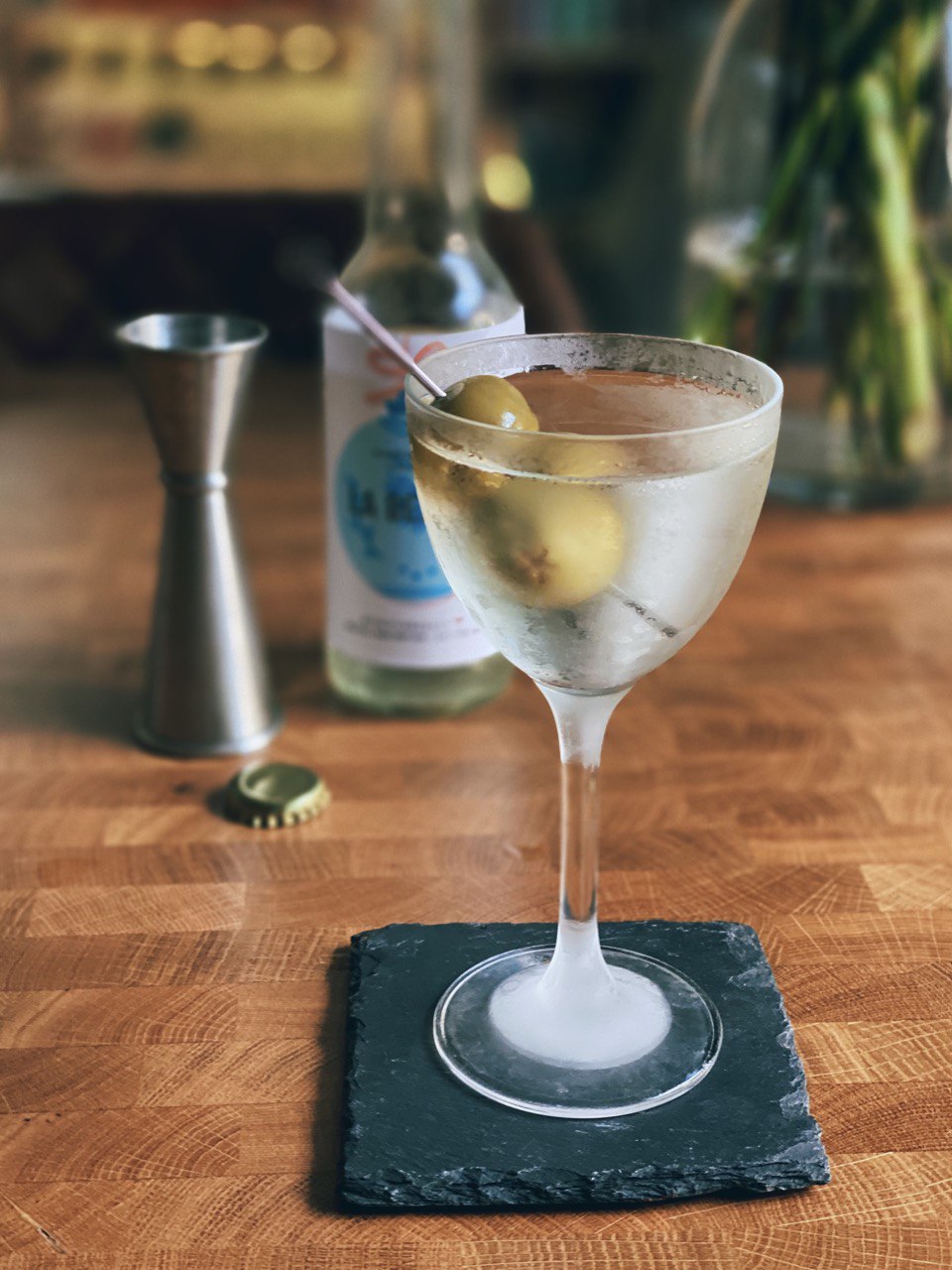
Also it means that The Stirred Art pretty much went public.
Things I enjoyed reading ¶
1. Important Notes on Learning Languages by Luke Smith ¶
Learning languages is a fascinating process, and even if these days I rarely do it with a definite goal in mind, I still enjoy every single bit. One of my biggest issues with getting into a new language was the fear that I sound wrong to folks around and myself. The author argues, that sounding weird to yourself is one of the signs that your pronounciation is correct and you are doing great.
Every language has its own set of phonological rules that determine what particular sounds are said how and where. Phonological rules give us "our accents." When someone speaks English in an accent, they are really just speaking English using the phonological constraints of whatever language they're more familiar with. If they speak English competently, there's at least some extent to which they are abandoning their native phonological rules.
What's the recipe for perfecting this RP accent? Just start mocking it.
2. Anti-Pasta: When Italian Futurists Tried to Ban Pasta in Italy by @ellengutoskey ¶
If there is one thing I couldn't imagine myself it is Italians trying (and partially succeeding) to ban past in Italy and replace it with rice.
While speaking at a multi-course banquet in Milan on November 15, 1930, Filippo Tommaso Marinetti presented his fellow Italians with an incendiary call to action. Pasta, he said, was a “passéist food” that “[deluded people] into thinking it [was] nutritious” and made them “heavy, brutish,” “skeptical, slow, [and] pessimistic.” As such, it should be abolished and replaced with rice.
However, there is definitely more to the story. I am just glad they don't do that anymore.
3. Knowledge Shares For Great Good by @ashfurrow ¶
As a person who strives for sharing knowledge whenever it is possible (even when I am not asked to), an idea of formalising the process and making it more accessible sounds like a call to action.
Knowledge Shares are a structured time to facilitate unstructured learning. Anyone can bring a topic to Knowledge Share, from a ticket that they're stuck on to an idea they have to a neat trick they recently learned.
4. The Hidden Fruits of the Deep by Georgina Wood ¶
Back then in my childhood I was a big fan of Jules Verne's Twenty Thousand Leagues Under the Seas and Captain Nemo's creativity, so can't really take seriously articles claming that there is food deep under water (who'd guess, right?).
However, this one is different as it is mostly focused on using these crops in the near future.
Growing in interstitial spaces too deep for SCUBA-diving scientists and too shallow for deep-sea exploration vehicles, deep-water seagrasses are hidden powerhouses that have sprouted silently on the peripheries for tens of millions of years.
5. Why Software Is Eating the World by @pmarca ¶
Despite being almost ten years old, this essay is something I ocassionally come across and happily re-read.
More and more major businesses and industries are being run on software and delivered as online services — from movies to agriculture to national defense. Many of the winners are Silicon Valley-style entrepreneurial technology companies that are invading and overturning established industry structures. Over the next 10 years, I expect many more industries to be disrupted by software, with new world-beating Silicon Valley companies doing the disruption in more cases than not.
On the other hand, being a part of those builders whos creation is "eating the world", I should always keep my eye on its diet.
Pretty much describes by day-to-day job.
I am making sure the software doesn't eat a rotten piece of the world and doesn't suffer from a food poisoning.
6. To listen well, get curious by @benskuhn ¶
Listening is harder than talking, and this is something I constantly struggle with. Maybe I could pick up some advice from this post:
When I’m curious about what someone’s saying, I often do repeat things back to them in my own words. But it’s because I’m genuinely curious, not because I’m checking off the “reflect words” box in my “be a good listener” checklist. That means I do it in a way that sounds like my natural speech, instead of mimicking them like a chatbot.
7. Why I keep a personal log of bugs by @gilgado_ ¶
There are plenty of personal "wiki"s out there, and while some people try to use them for every single piece of knowledge they have, I am more keen on exploring further the idea of preserving bugs in forms of tiny post-mortems.
I’ve started to document those bugs, only the ones where I was the only engineer who did it so I can totally understand the context and reflect on what I personally did.
There are many different ways to do this, but I thought it’d be cool to have one place where I can gather all of them and search in the future for references and patterns.
The more I observe the bugs I deal with on pretty much daily basis, the more of them seem terribly similar to each other.
8. What Did the Past Smell Like? by Ann-Sophie Barwich ¶
We have art museums, photos, videos, and other ways to go back to the past and remind ourselves of something. How come we can't do it with smells? Apparently we can, and there lots of people building such museums of smells, and reconstructing the smells from the past.
The sense of smell also poses interesting neuroscientific puzzles here. It is the only sense that bypasses the thalamus and has almost immediate access to the core cortex—including the hypothalamus, involved in the processing of new memories and associative learning. How the brain makes sense of scents has only recently garnered proper attention. How the brain makes memories with scent now makes for the next neural frontier.
9. Become shell literate by Drew DeVault ¶
My weapons of choice regardless of the task include zsh, git, and vim. Nowadays it's quite popular to protect one's favourite GUI tools, and claim that whoever advices to use shell is doing everything wrong and gatekeeps people from learning. I find this to be a dangerously wrong misconception.
Shell literacy is one of the most important skills you ought to possess as a programmer. The Unix shell is one of the most powerful ideas ever put to code, and should be second nature to you as a programmer. No other tool is nearly as effective at commanding your computer to perform complex tasks quickly — or at storing them as scripts you can use later.
If you enjoy working with git with a mouse and by dragging fancy arrows, please keep doing so. However, if you do not understand how this fancy arrows work behind the curtains, there is still so much more you could learn as an engineer, and there is definitely nothing wrong with accepting that.
10. Buy Don't Build: Avoiding Ops For Fun and Profit by Jake Rottersman ¶
A controversial take on maintaining custom versions or building services from scratch. It does take time and energy indeed, but I'd argue that the expirence and control which comes with that worth way more.
Keeping systems up in production takes time and energy. Building them isn’t where most of the expense lies. Instead, that comes with running and maintaining complicated systems. Most enterprise systems require an engineering team to keep them running. Engineers aren’t cheap to hire and there is also additional complexity that gets introduced to keep a large number of teams coordinated. This all results in slower decision making.
Things I didn't know last Tuesday ¶
1. Squirrels used to be pets ¶
So sad that presidents don't keep squirrels as pets anymore.
By the 1700s, a golden era of squirrel ownership was in full swing. Squirrels were sold in markets and found in the homes of wealthy urban families, and portraits of well-to-do children holding a reserved, polite upper-class squirrel attached to a gold chain leash were proudly displayed (some of which are currently at the Metropolitan Museum of Art).
2. Mooning ¶
To all those thinking that one can't learn something new from Simpsons, here I go.
Bart's favourite self expression has a name:
Mooning is the act of displaying one's bare buttocks by removing clothing, e.g., by lowering the backside of one's trousers and underpants, usually bending over, whether also exposing the genitals or not. Mooning is used in the English speaking world to express protest, scorn, disrespect, or provocation, or can be done for shock value, fun, a joke or as a form of exhibitionism.

3. Salmon sushi is not a Japanese invention ¶
Last time we have established that curry is not Japanese. Today, in the same category of life-changing trivia:
In fact, salmon sushi could not be found on menu cards in Japan until the 1990's. Before the 1990's, salmon was regarded as a garbage fish by the Japanese, which you only ate cured, fully pan-fried or grilled. Salmon was used to fill out cheap meals. It was never used in the traditional Edo-mae style of sushi or eaten raw because of the Pacific salmon’s tendency for carrying infections by parasites.
So salmon sushi came from Norway which was looking for a new market to sell their salmon too.
What is a real Japanese invention then?...
4. Teledisko ¶

Teledisko is an old phone booth transformed into a private club for you and your friends. The disco is coin-operated: once you’ve paid the entrance fee and you’ve made sure that your best friends are inside, the party is about to begin.
Sounds like a great way to have a very private party.
5. Eye color changes past early childhood ¶
Apparently the defauly eye colour is blue, and for most people it changes in the first 3 months.
Most individuals achieve stable eye color by 6 years of age. However, a subpopulation of 10% to 15% of white subjects have changes in eye color throughout adolescence and adulthood in the eye color range that can be expected to reflect changes in iridial melanin content or distribution.
I wonder if on the DNA level this is represented by an Optional var or by passing a default method parameter?
6. The Water Clock ¶
The water clock uses the force of water to move the pendulum and wind the clock.

There are only two of them left in Rome, which is not that much comparing to thousands of sundials.
7. Earwax type is controlled by a gene ¶
Most people have one of two types of earwax. Wet earwax is sticky and yellowish brown to dark brown in color, while dry earwax is crumbly and gray to tan.
Earwax type is not used very often to illustrate basic genetics, but unlike most human characters that are used (tongue rolling, attached earlobes, etc.), it really is controlled by a single gene with two alleles.
This is quite interesting, because usually the power of genes is illustrated by eye colour or bent pinkies, neither of which is controlled by genes.
8. Moët Ice Impérial ¶
The article is a very nice overview of ice's history and inventions of ice machines. Some things should have never been invented though:
In 2011, Moët Hennessey attempted to replicate the Magners magic with Moët Ice Impérial, “the first champagne specifically designed to be served over ice”. The ice-cubes-in-wine trend would reach its logical conclusion five years later with the popularisation of frosé, essentially a rosé wine-flavoured Slush Puppy.
9. Mozart wrote his first symphony because he wasn't allowed to play ¶
Apparently Mozart didn't use any musical instruments to write down his first symphony, courtesy of his dad.
So that Papa could have quiet and rest, the children were not allowed to touch a keyboard. To pass the time, Wolfgang decided to write a symphony for full orchestra. He was able to write the piece without a clavier because he had the inborn faculty called “perfect pitch,” meaning he could hear notes accurately in his head or name any note played to him.
10. Cryofiltration ¶
While building last week's Michelin-star dinner, I missed out on an unusual clarification technique which sounds quite simple:
Cryofiltration simply involves freezing your product, (you can do it with just about anything – broths, fruits, veggies, anything) then defrosting it in the fridge by placing it on a filter or cheesecloth with a container underneath so that as it defrosts, the liquid seeps through the filter and the more solid parts stay on top.
Sounds like a plan for the weekend (just need to find lots of tomato juice for a transparent Bloody Mary).
Book of the week ¶
Lately I became quite fascinated with twists and turns of English grammar. Truss Lynne partly explains why in her Eats, Shoots and Leaves:
Encouraged to conduct easy tests on television, I discovered to my horror that most British people truly do not know their apostrophe from their elbow. “I’m an Oxbridge intellectual,” slurred a chap in Brighton, where we were asking passers-by to “pin the apostrophe on the sentence” for a harmless afternoon chat-show. He immediately placed an apostrophe (oh no!) in a possessive “its”. The high-profile editor of a national newspaper made the same mistake on a morning show, scoring two correct points out of a possible seven.
After reading through an American editor's book on grammar and punctuation, I could not pass by a British version on the same topic and so far have not been disappointed.
Which reminds me: the last time I asked an English teacher about grammar was at my eighth year at school. She advised me to focus on more urgent matters, like reciting London boroughs by heart.
Learning on my own feels better, as one might guess.
Thank you and see you in a week! ¶
If you have any questions, or want to suggest a link for the next newsletter, please drop me a message on Twitter or reply to this email.
Cheers! 🍸